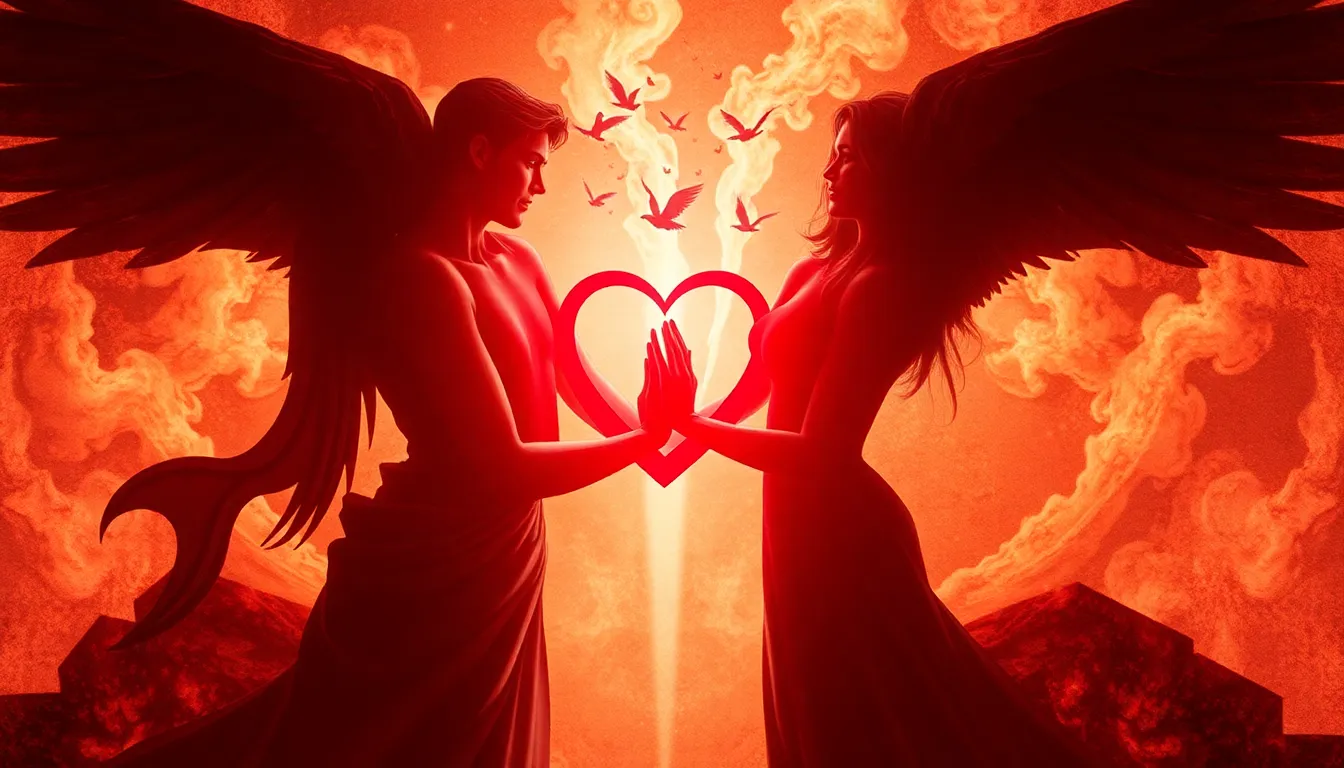The Myth of True Love: Exploring the Ideal in Ancient Lore
I. Introduction
True love is often defined in contemporary society as an idealized and unconditional bond between two people, characterized by deep emotional connection, passion, and commitment. It is a concept that has been romanticized in literature, film, and everyday conversations.
This article aims to analyze ancient lore and its influence on modern perceptions of love, exploring how historical narratives have shaped our understanding of what true love is and how it is expressed.
II. The Historical Context of Love Myths
Love has been a subject of fascination across civilizations, with ancient cultures offering a rich tapestry of myths that reflect their societal norms and values. This overview will focus on the love myths from ancient Greek, Roman, and Egyptian civilizations.
Mythology played a crucial role in shaping cultural norms about love, serving as both a reflection of and a guide to the expectations and behaviors surrounding romantic relationships.
A. Overview of Love in Ancient Civilizations
- Greek Civilization: Love was often personified by deities such as Eros and Aphrodite, embodying both physical desire and idealized affection.
- Roman Civilization: Romans viewed love through the lens of passion and duty, with myths that highlighted the interplay between desire and societal expectations.
- Egyptian Civilization: Love in ancient Egypt was intertwined with spirituality, as seen in the myths of Osiris and Isis, which symbolize eternal love and devotion.
B. The Role of Mythology in Shaping Cultural Norms About Love
Mythology not only entertained but also taught moral lessons and established societal norms regarding love and relationships. These ancient stories often reinforced the idea that love was both a divine gift and a complex human emotion.
III. Ancient Greek Myths of Love
Greek mythology offers some of the most poignant stories about love, depicting both its beauty and its challenges. Two of the most notable myths are those of Eros and Psyche, and Orpheus and Eurydice.
A. Eros and Psyche: A Tale of Trials and Triumphs
The myth of Eros and Psyche highlights the trials that love can endure. Psyche, a mortal, is subjected to numerous challenges set by Venus, Eros’s mother, who feels threatened by Psyche’s beauty. Ultimately, Psyche’s perseverance and love for Eros triumph over adversity, leading to her apotheosis as a goddess.
B. Orpheus and Eurydice: The Power of Love and Loss
The tragic tale of Orpheus and Eurydice speaks to the depth of love and the pain of loss. Orpheus descends into the Underworld to retrieve his beloved Eurydice, but his inability to trust her leads to her permanent loss. This myth emphasizes the idea that true love can transcend even death, but also warns against the fragility of trust in relationships.
C. Implications of These Myths on the Concept of Soulmates
Both myths suggest a belief in soulmates—partners destined to be together despite obstacles. This notion has significantly influenced modern romantic ideals, fostering the idea that love is fated and that there exists someone perfect for each individual.
IV. Roman Interpretations of Love
Roman mythology, while influenced by Greek narratives, offers a distinct perspective on love, often intertwining it with themes of war and power.
A. Venus and Mars: The Dichotomy of Passion and War
The relationship between Venus, the goddess of love, and Mars, the god of war, represents the duality of love as both a nurturing force and a source of conflict. Their passionate affair symbolizes the complexities of romantic relationships, where love can inspire both creation and destruction.
B. The Influence of Roman Literature on Romantic Ideals
Roman poets like Ovid and Virgil explored love in their works, often depicting it as both a joyous and tumultuous experience. Their writings contributed to a cultural narrative that romanticized love while acknowledging its challenges.
C. How Roman Myths Reinforced Societal Views of Love
Roman myths reinforced societal views that intertwined love with duty, honor, and social status. These narratives shaped the expectations of romantic relationships in Roman society, emphasizing the importance of loyalty and commitment.
V. Love in Eastern Mythologies
Eastern mythologies offer rich narratives that contrast with Western ideals of love, often emphasizing harmony and spiritual connection.
A. Hindu Perspectives: Radha and Krishna’s Eternal Love
The love story of Radha and Krishna is emblematic of divine love in Hinduism, representing the soul’s yearning for the divine. Their relationship transcends the physical realm, emphasizing the spiritual connection between lovers.
B. Chinese Legends: The Cowherd and the Weaver Girl
This popular Chinese tale narrates the love between a cowherd and a weaver girl, separated by the Milky Way. Their annual reunion symbolizes the enduring nature of true love, despite obstacles.
C. How Eastern Myths Contrast with Western Ideals of True Love
Unlike Western myths that often focus on individual passion and possessiveness, Eastern love stories frequently highlight themes of sacrifice, duty, and spiritual connection, suggesting a more communal and holistic view of love.
VI. The Role of Myth in Defining Relationship Expectations
Myths have historically shaped societal expectations regarding relationships, influencing how individuals perceive their partners and love itself.
A. The Archetype of the Perfect Partner
Many myths create archetypes of the perfect partner, setting unattainable standards that can lead to dissatisfaction in real-life relationships. These archetypes often emphasize traits such as beauty, bravery, and unwavering devotion.
B. The Influence of Myths on Modern Relationship Dynamics
Modern relationships are often influenced by the ideals set forth in ancient lore, leading individuals to seek out characteristics in partners that may not align with reality.
C. Examining How Myths Set Unrealistic Standards for Love
The mythologization of love can generate pressure to conform to certain ideals, resulting in disillusionment when real-life relationships do not measure up to these expectations.
VII. The Psychological Impact of Love Myths
Beliefs about love rooted in ancient myths can have profound psychological effects on individuals and their relationships.
A. The Search for “The One”: A Psychological Perspective
The notion of “finding the one” can lead to unrealistic expectations and prolonged searches for an ideal partner, often resulting in dissatisfaction and frustration.
B. The Effects of Love Myths on Mental Health and Relationships
Myths about love can contribute to anxiety and depression, as individuals grapple with the gap between myth and reality. This disconnect can strain relationships and lead to feelings of inadequacy.
C. Dissatisfaction in Love: Myth vs. Reality
As individuals navigate the complexities of love, the contrast between myth and reality often leads to dissatisfaction, as they may struggle to reconcile their experiences with the idealized versions of love they have internalized.
VIII. Deconstructing the Myth of True Love
To foster healthier relationships, it is essential to deconstruct the myths surrounding true love and understand the varied experiences of love throughout history.
A. Historical Evidence of Varied Love Experiences in Ancient Cultures
Ancient cultures exhibited a diverse range of love experiences, from romantic to platonic, reflecting the multifaceted nature of human relationships.
B. The Fluidity of Love: Lessons from Ancient Lore
Ancient myths teach us that love is not static but fluid, evolving with time and circumstances. This understanding can help individuals approach love with greater adaptability and openness.
C. Reframing True Love in a Modern Context
Reframing true love to include acceptance of imperfections and the reality of relationships can


